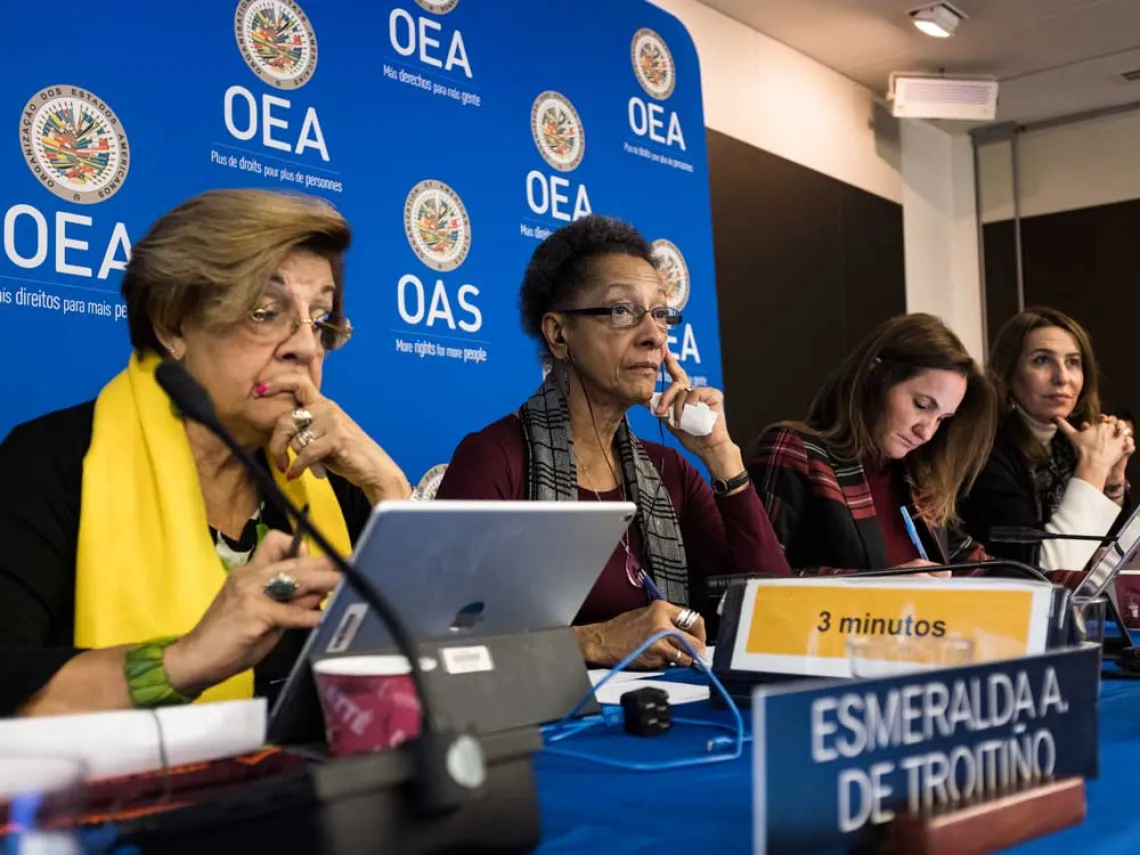University of Arizona Law Clinic Director, Student to Testify before Organization of American States
The May 9 hearing is about the criminalization of indigenous resistance to extractive industries in the U.S.

Commissioners at an Inter-American Commission on Human Rights (IACHR) panel. Image credit: IACHR.
As the Inter-American Commission on Human Rights (IACHR) gathers for public hearings this week, two representatives from the University of Arizona James E. Rogers College of Law’s Indigenous Peoples Law and Policy (IPLP) program will be on hand to provide testimony.
Seanna Howard, director of the International Human Rights Advocacy Workshop and a professor of practice; and Michelle Cook, Doctor of Juridical Science candidate, will testify before the IACHR in a hearing on May 9 in Kingston, Jamaica about the criminalization of indigenous resistance to extractive industries in the United States.
View a live webcast and hearing details on the Inter-American Commission on Human Rights website.
The IACHR hearing is in response to a request submitted by University of Arizona Law’s Indigenous Peoples Law and Policy (IPLP) Program and the Water Protector Legal Collective. The Water Protector Legal Collective is a non-profit advocacy organization that provides legal defense to the indigenous-led resistance to the Dakota Access Pipeline (DAPL) at Standing Rock, North Dakota and is a client of Howard’s International Human Rights Advocacy Workshop. The hearing is co-sponsored by more than 70 indigenous and environmental organizations from across the world.
Howard and Cook have worked to build a global coalition to document and report on human rights violations against indigenous peoples resisting DAPL and other pipeline projects across the United States. The IACHR will hear how the practices of law enforcement and non-state actors violate the United States obligations under a number of international agreements, including the American Declaration on the Rights and Duties of Man and American Declaration on the Rights of Indigenous Peoples.
The hearing forms part of an international legal strategy that the International Human Rights Advocacy Workshop developed at the request of the Water Protectors Legal Collective to respond to the human rights concerns facing No-DAPL “water protectors.” The hearing follows up on a similar report and panel discussion that Howard and IPLP organized at the United Nations in April 2018.
“This is a rare opportunity to appear before a high-level international body and report on one of the most critical human rights issues affecting indigenous peoples today,” says Howard. “It is the only hearing involving the United States this session which demonstrates the level of concern by the international community over this situation.”
The purpose of the hearing is for the IACHR to examine the practices of law enforcement, the criminalization of constitutionally protected rights to peaceful protest, and the use of excessive force against human rights defenders at sites like the Dakota Access Pipeline. Commissioners will hear live testimony from indigenous peoples harmed by these practices and receive written reports documenting their experiences.
Among those testifying is Michelle Cook, an IPLP Doctor of Juridical Science candidate, board member of the Water Protectors Legal Collective, and founder of the Divest, Invest, Protect campaign. Cook will describe the events she witnessed at Standing Rock when indigenous peoples and their allies were arrested for resisting construction of the Dakota Access Pipeline, an energy project approved without consent from the Standing Rock Sioux tribe.
The IACHR is the human rights arm of the Organization of American States (OAS) that was established in 1959 and is charged with promoting and protecting human rights in the hemisphere.
